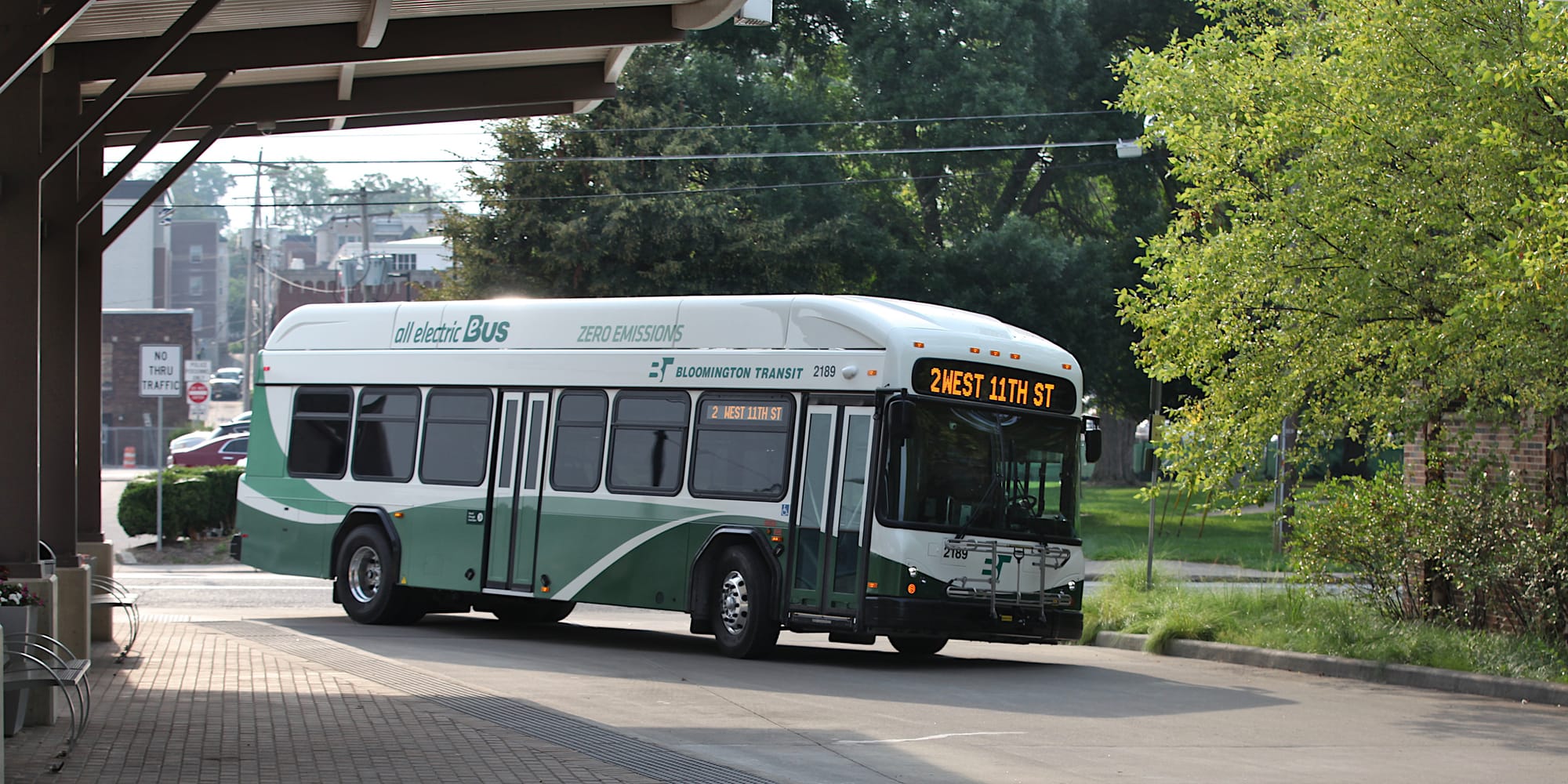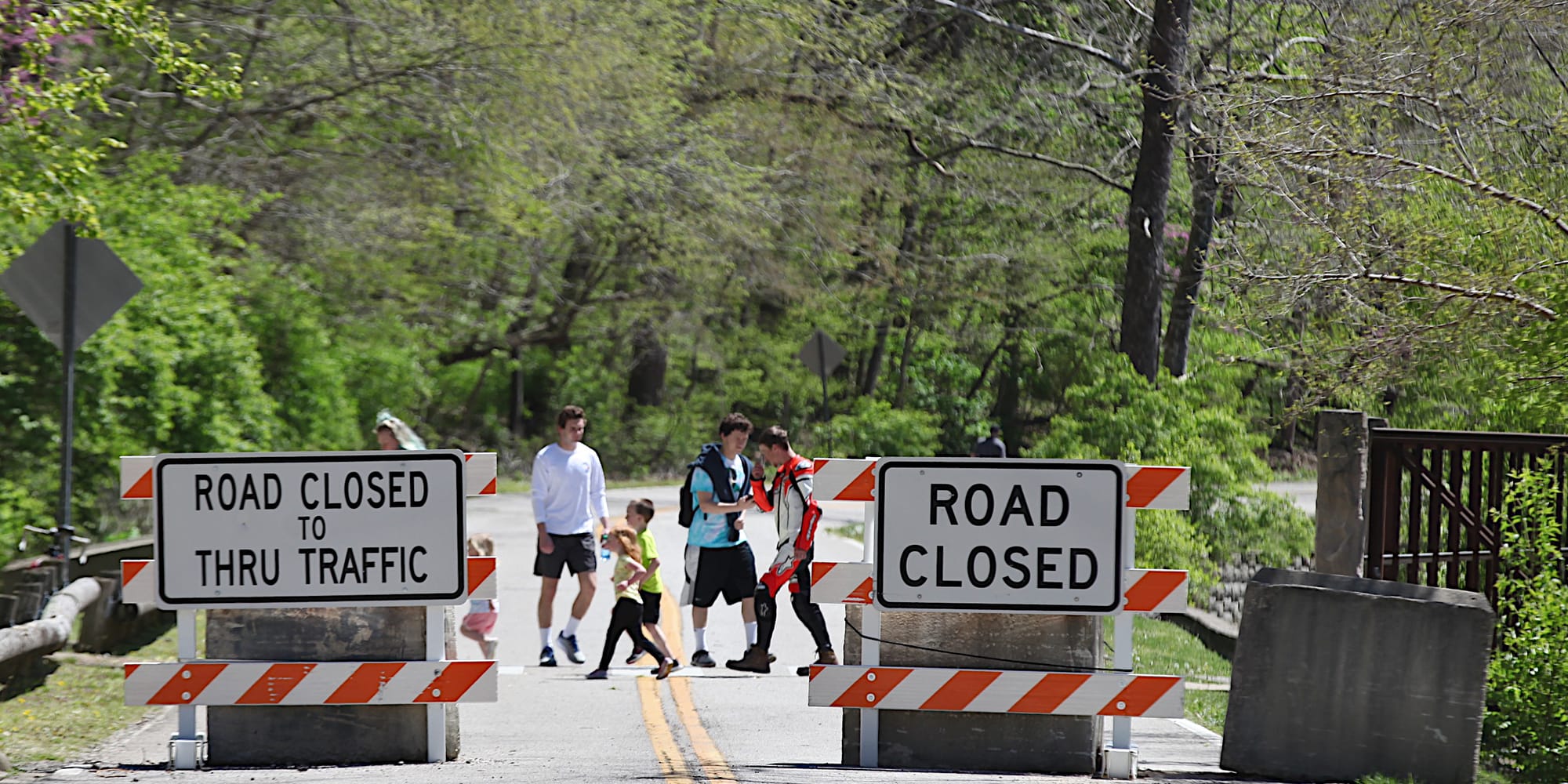From poison ivy, to public transit, to parks bond money, Bloomington 2022 budget hearings prompt question: Whose job is it?




Wednesday’s city council hearings on the administration’s proposed 2022 budget featured presentations from four different city of Bloomington departments—housing and neighborhood development (HAND), economic and sustainable development (ESD), community and family resources (CFRD), and parks and recreation.
Also a part of the mix on Wednesday was a presentation from the Bloomington Housing Authority, and the city clerk’s office.
One of the common themes that cut across comments about the presentations—from councilmembers and the public—could be reduced to the question: Whose job is it?
Whose job is it to clear poison ivy from places where it has overgrown a sidewalk? Whose job is it to staff the front desk in the combined council-clerk office?
Whose job is it to decide whether a parks bonds can be used for a traffic calming project instead of a non-motorized trail? Whose job is it within the administration to advocate for public transit?
The issue of advocacy for public transit led to a chippy exchange between deputy mayor Don Griffin and councilmember Steve Volan—who’s in his 18th year of service on the city council.
Griffin asked Volan a pointed question: “How long have you been in government?”
Poison ivy clearance
During public comment time on the HAND department’s budget, Bloomington resident Greg Alexander described his own efforts to clear poison ivy from places where it has overgrown sidewalks.
Alexander had worked to clear the itch-inducing plant from places along the sidewalk route between his house and Fairview Elementary School. He said he didn’t think the burden of handling pedestrian transportation should be placed on HAND, but if it’s HAND’s responsibility, then the department is not doing a good job.
Here’s how Alexander wrapped up his comment:
HAND has an absolutely huge responsibility. I don’t think it makes any sense that pedestrian transportation is part of that burden. But since that’s where it’s at, I wish the HAND director could tell you directly: That task is not being completed. Maybe it should be assigned to a different department. I’ve got about another three hours of work ahead of me, before I’d say that route is done. It sure would be awesome, if someone else would take care of the two properties where poison ivy still grows onto the sidewalk. I am so itchy! Thank you for your time.
HAND director John Zody later responded to Alexander by saying, it’s a Title 12 issue, not a Title 6 issue, which makes clearing obstructions from sidewalks, like poison ivy, a question for the engineering department, not the HAND department.
Title 12 is the part of Bloomington’s local laws that relate to streets, sidewalks and storm sewers. Title 6 deals with health and sanitation.
Zody said, “So as far as neighborhood compliance goes,… we are out in the neighborhoods, if we see something, I think we communicate it back, but it’s largely focused on engineering—on that side of the house, if you will. ”
Reception desk
The clerk’s office and the city council office share an office suite on the ground floor of city hall with a single reception desk for the public.
Whose job is it to staff that front desk?
At Wednesday’s budget hearing on her budget, city clerk Nicole Bolden described how the staffing of the reception desk had historically been shared between the clerk’s office and the city council’s office.
A few years ago, the council staff asked if the clerk’s office would take over the staffing of the front desk area full time, Bolden said. Bolden told councilmembers she had agreed to that, with the caveat that if the workload became too great, additional staff for her office would be hired.
That’s why the 2022 budget includes the addition of a third staff member to join the two deputy clerks.
The additional workload described by Bolden is not limited to staffing the front desk. It includes providing support for an increased number of council meetings that tend to be lasting longer.
Councilmembers on Wednesday night were supportive of Bolden’s request for the additional staff position.
The city clerk is an elected position, chosen by voters every four years on the same cycle as elections for mayor and city council. Bolden was first elected in 2015, which makes this year her sixth as city clerk.
Parks bond use
Responding to the presentation of the 2022 parks and recreation budget by director Paula McDevitt, councilmember Matt Flaherty offered a sharp criticism of the decision by the parks department to reopen the Lower Cascades Road, after a year-long pilot closure.
Instead of a non-motorized trail project, the Lower Cascades Road is now being converted into a traffic-calming project for the roughly half-mile stretch of road.
The pilot project was supposed to test the implementation of a non-motorized trail project, which was part of a multi-project package for $10 million in bonds, approved by the city council in 2018. That was the 200th anniversary of Bloomington’s founding, so the bonds were branded by mayor John Hamilton’s administration as “bicentennial bonds.”
The concept was for the new non-motorized path, using the existing roadway, to connect up to other segments of trails and to help provide a bicycle route to Bloomington North High School. It was priced at $2.1 million.
The project approved by the council was described as closing one lane of the road. The year-long pilot closure closed off both lanes to automobiles.
In his remarks to the city council on Oct. 31, 2018, Bloomington’s mayor John Hamilton described the Lower Cascades trail project as “converting one lane of the roadway to a bike-ped trail connecting Clubhouse Drive south to College Avenue and Miller Showers [Park].”
Dave Williams, who was at the time the operations director for the Bloomington parks department, told the council at the Oct. 31, 2018 meeting that the Lower Cascades Trail project “would connect the park…to Miller Showers Park.” Williams added, “This would be an on-road one-way option, routes and directions to be determined, from Clubhouse Drive south to the main park property, aligning and connecting with Miller Showers Park.
The pilot closure of the road generated vocal opposition, from those who were concerned about maintaining accessibility of the park to the disability community.
The decision to reopen the road to automobiles, but first to design and implement traffic-calming measures, was supported at Wednesday’s budget hearing by councilmembers Sue Sgambelluri and Susan Sandberg. They characterized it as city staff listening to feedback from residents.
Sgambelluri told McDevitt, “A lot of taxpayers showed up, and a lot of taxpayers debated. …Those taxpayers had their voices heard, and I appreciate all that you did to listen to constituents.”
Flaherty’s concern decision could be paraphrased like this: Whose job was it to decide whether the use of the money for a future traffic-calming project, instead of a non-motorized trail, met the requirements of the bond issuance?
Flaherty himself put it this way, “I’m wondering why that wasn’t brought to council since we were the ones who authorized the bonds.”
McDevitt told Flaherty: “That was done with approval and review from bond counsel with the help of [city controller] Mr. Underwood.”
Flaherty responded, “I honestly just don’t find it acceptable that the administration unilaterally decided to disregard those bonds, even if we thought it was legally permissible somehow in a narrow sense.”
Flaherty continued, “The ‘whereas’ clauses in the resolution literally say a trail from Clubhouse Drive to College Avenue at Cascades Park.” He added, “Similarly, I find it unacceptable that we have the administration unilaterally decide to ignore an adopted transportation plan that this council adopted.”
Public transit advocacy: Whose job is it?
Alex Crowley, director of Bloomington’s economic and sustainable development (ESD) department, presented ESD’s proposed 2022 budget on Wednesday night.
Responding to Crowley’s presentation, councilmember Steve Volan asked a series of questions about who’s responsible for what in the city administration.
Volan started with a question about who in the administration would be responsible for advocating for bus rapid transit (BRT). Crowley said, “If [BRT] is a helpful and an important investment, [the economic and sustainable development department] will certainly be advocating for it, we’ll be supporting it.” He continued, “It’s not something that we would deliver by any means. …It’s not within our bailiwick at all to set up transit lines.”
Crowley expanded on the general approach taken by ESD. He said, “We do get heavily involved in decisions that are being made by other departments. We advocate for them.” Crowley added, “I personally think it’d be really interesting to take a look at what [BRT] might do for us.”
Volan followed up with a question about parking prices: Who should set parking prices?
Deputy mayor Don Griffin responded by trying to steer the conversation to the ESD budget. “We’re getting kinda in the weeds,” Griffin said, “You’re asking him questions on other departments and where things should lie. Why don’t we stick to ESD, and what they do?”
Volan insisted: “With all due respect, Mr. Griffin, I think that my question is relevant. And I would appreciate an answer from either you or him.”
Crowley responded by describing a spreading of responsibility: “Ultimately, it is set by the parking services group—they are the ones who set parking prices. Now, they’re not doing it in isolation. There’s a lot of collaboration within the city between departments.”
Later, Volan asked whether the new 4th Street parking garage would have a sign indicating how many parking spaces are free.
Crowly told Volan he didn’t know—he’d find out. Griffin told Volan that was a question for parking enforcement.
Griffin’s remark prompted Volan to return to the previous topic of BRT. “Well, Mr. Griffin, I think I’m going to turn to you then because, I’m trying to determine which department in the city—if not ESD—advocates for things like public transit within the cabinet. OK?” Volan said.
Volan asked Griffin, “Which department in the city, if not Mr. Crowley’s, should I look to for leadership when it comes to [BRT]. Is Bloomington Transit exploring this kind of idea?”
Griffin responded by suggesting a one-on-one conversation would be a better approach. “You know what, this is a much longer conversation and why don’t we table that? And maybe you can contact me later on? Or I’ll contact you later on this? This is an off-the-the air conversation, I’d imagine.”
Volan insisted, “Mr. Griffin, I would like to… be able to at least ask a question without being told…I mean, I appreciate meeting off air.”
Volan continued, “But I’m trying to understand which department—because we’ve moved parking away from police. And now it’s in, or rather decision making for parking, is it in public works? Or is it in planning? And all of this has an economic development question.”
Griffin’s reply to Volan, an 18-year veteran on the city council: “How long have you been in government?”
That prompted Matt Flaherty, who serves the council’s parliamentarian, to intercede with a request for clarification from Dave Rollo, who was chairing the session, about how questions from councilmembers and responses from staff were supposed to be handled.
Rollo concluded that Volan had received an answer to his question. Volan disagreed. Volan’s turn ended like this:
Rollo: …Do we not have the answer that we…
Volan: No, Mr. Chair, we do not.
Rollo: We don’t?
Volan: No! In fact, I don’t appreciate any of this interruption or your defense of it. I mean, we are asking tough questions about the budget and about how the administration manages the budget in general, OK? And the fact that this question may seem like it, I mean, I believe that, what is Mr. Crowley’s charge, if not economic development? Is public transit not an essential component of economic development? Are, you know, when I asked about, like, how is Indianapolis building bus rapid transit, how do they have shovel-ready programs to get 80 million? I mean, we’re about a 10th, the size of Indianapolis.
Rollo: Councilmember Volan.
Volan: Isn’t public transit an economic development tool?
Rollo: OK. Well, we’ll take that as a rhetorical question. I think your time has been utilized.
Volan: My time has been taken by other people, Mr. Chair. I’ll appreciate some back.
Thursday is the final night of four budget hearings this week. The three departments that will present their proposed 2022 budgets are planning and transportation, engineering and public works. The meeting starts at 6 p.m.




Comments ()